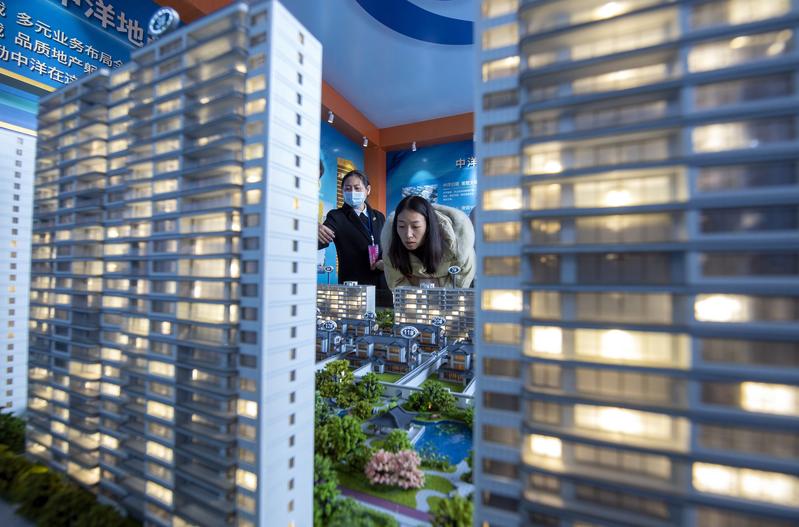Total property investment stood at 13.73 trillion yuan during first 11 months
 A potential homebuyer looks at a property model during an expo in Hai'an, Jiangsu province. (XU JINGBAI / FOR CHINA DAILY)
A potential homebuyer looks at a property model during an expo in Hai'an, Jiangsu province. (XU JINGBAI / FOR CHINA DAILY)
New and pre-owned home prices in China's major cities continued to grow at a slower pace, and the latest top-level meeting's stance to promote the healthy development of the property sector is expected to further stabilize market expectations, said experts.
In November, most of the 70 large and medium-sized Chinese cities saw very modest growth in new and existing home prices compared to a year ago, and their month-on-month growth rate also fell, said Sheng Guoqing, chief statistician with the National Bureau of Statistics' urban division.
New home prices in the 70 biggest cities rose 2.4 percent year-on-year in November, but dipped 0.3 percent from October. Among them, up to 59 cities reported negative growth in new home prices month-on-month.
The four biggest cities saw little change in their average new home prices from the previous month. Beijing and Shanghai reported price increases of 0.3 percent and 0.2 percent, respectively, while Shenzhen remained unchanged and Guangzhou declined 0.6 percent.
Compared with a year earlier, the benchmark cities' new home prices grew at a slower pace of 4.8 percent.
The 31 second-tier cities tracked by the NBS slid 0.4 percent on average month-on-month. And their average prices grew 3.3 percent compared to last year. Among the 35 third-tier cities, the two figures were negative 0.3 percent and positive 1.4 percent, respectively.
"This is the third month in a row for the new home price index to drop month-on-month, indicating that more property developers were promoting properties under mounting pressure from destocking of residential homes," said Yan Yuejin, director of the Shanghai-based E-house China Research and Development Institution.
In order to stabilize home prices amid cooling market sentiment, bringing about rational home consumption is important to reach a supply-and-demand balance, Yan said.
The pre-owned home market showed a similar trend. The four first-tier cities' existing home prices edged down 0.2 percent from the previous month.
In the 31 second-tier cities, used home prices declined 0.4 percent from a month ago, but grew 2.0 percent year-on-year. The 35 third-tier cities saw their existing home prices lose 0.4 percent from the previous month, against an increase of 0.5 percent from last year.
"The eased financing in some commercial banks has stimulated home purchasing activity as the new year is approaching, and market expectations are getting a boost," said Xu Xiaole, chief analyst with the Beike Research Institute.
Recent statements made during a meeting of the Political Bureau of the Communist Party of China Central Committee and the annual Central Economic Work Conference made it clear that "housing is for living in, not for speculation", emphasizing that the property market should better satisfy the reasonable living demand of homebuyers as well as promote the property sector's healthy development and form a virtuous cycle.
"In line with such a stance, we may see the home credit and mortgage environment further improve, and some cities may design measures to support first-time home buying and demand for better living in the future," Xu said.
In first-tier cities, housing markets are very resilient, and market confidence is still there amid the market adjustments, said Lu Wenxi, a researcher at Centaline Shanghai.
Property investment stood at around 13.73 trillion yuan ($2.16 trillion) in the first 11 months, data from the NBS showed. Compared with the same period in 2019, property investment climbed 13.2 percent, putting the two-year average at 6.4 percent.


